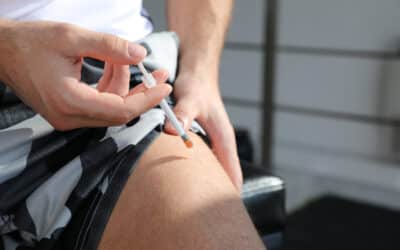Curious about how to get Human Growth Hormone (HGH) safely and legally?
What Are the Steps to Get a Prescription for HGH for Growth Hormone Deficiency?
The most reliable and legal way to obtain HGH is through a doctor’s prescription. Here are the steps involved in the HGH prescription process:
- Consultation with a Healthcare Provider: You must first schedule an appointment with a doctor who specializes in hormone therapies, such as those at an HGH clinic. They will evaluate your symptoms, review your medical history, and determine if you have a growth hormone deficiency.
- Blood Testing: To confirm a deficiency, your doctor will order blood tests to measure your HGH levels. This helps determine if HGH therapy is necessary.
- Diagnosis: If your test results indicate a low level of HGH, your doctor may diagnose you with adult growth hormone deficiency (AGHD) and recommend human growth hormone therapy.
- Prescription and Treatment Plan: If you’re a good candidate, your doctor will write you a prescription for HGH and develop a personalized treatment plan. This typically includes HGH injections that you can administer at home.
It is essential to follow this legal route, as obtaining HGH without a prescription is illegal and can pose significant health risks.
Who Needs HGH?
HGH plays a crucial role in cell regeneration, growth, and maintaining healthy tissue, including the brain and various vital organs. As we age, HGH levels naturally decline, leading to a desire among many to explore growth hormone therapy to restore those levels for health, fitness, or anti-aging purposes. If you’re wondering how to get HGH legally, this guide will walk you through the process of obtaining a prescription, the benefits of therapy, and natural ways to increase your levels.
Understanding Human Growth Hormone (HGH)
Human Growth Hormone (HGH) is a vital hormone produced by the pituitary gland that plays a crucial role in growth, development, and overall health. HGH stimulates the growth of bones, muscles, and other tissues, and its levels typically peak during puberty. As we age, HGH production naturally declines, leading to a range of age-related health issues. Understanding HGH is essential for maintaining optimal health and addressing potential deficiencies.
Growth Hormone Deficiency and HGH Therapy
Growth Hormone Deficiency (GHD) occurs when the pituitary gland does not produce enough HGH, leading to a range of symptoms, including fatigue, muscle weakness, and decreased bone density. HGH therapy is a medical treatment that involves administering synthetic HGH to restore optimal levels. HGH therapy can help alleviate symptoms of GHD, improve overall health, and enhance quality of life. However, it is essential to consult a certified healthcare provider to determine if HGH therapy is right for you.

Finding a Certified HGH Provider
Finding a certified HGH provider is crucial for safe and effective HGH therapy. Look for a healthcare provider with experience in hormone replacement therapy (HRT) and a proven track record of treating patients with HGH deficiency. Ensure that your provider is licensed and certified to prescribe HGH and has a thorough understanding of the potential risks and benefits. A certified HGH provider will work with you to develop a personalized treatment plan tailored to your specific needs and health goals.
What Are the Benefits of HGH Therapy?
For those diagnosed with HGH deficiency, HGH therapy can offer several benefits, including:
- Increased Muscle Mass: HGH stimulates the production of collagen, which helps improve muscle strength and exercise performance. Many men use HGH for muscle growth.
- Fat Loss: HGH increases lipolysis, the breakdown of lipids, which can lead to fat loss, especially in the abdominal area.
- Improved Bone Density: HGH helps in maintaining bone density, which is crucial for reducing the risk of fractures as you age.
- Enhanced Recovery and Healing: HGH promotes cell regeneration, which helps speed up recovery after injuries or intense physical activities.
Additionally, synthetic human growth hormone is often discussed in the context of addressing age-related changes, though its efficacy and safety for healthy adults remain subjects of debate.
Learn more about the HGH therapy benefits for improving overall health and fitness.
HGH Treatment Options and Effectiveness
HGH treatment options vary depending on individual needs and health goals. HGH injections are the most common form of treatment, and they can be administered via a shallow injection into the fatty tissue just beneath the surface of the skin. The frequency and dosage of HGH injections depend on individual needs, and treatment plans can range from $300 to $1500 per month. While HGH therapy can be effective in alleviating symptoms of GHD, it is essential to discuss potential side effects, such as joint and muscle pain, carpal tunnel syndrome, and swelling, with your healthcare provider.
How Can I Increase HGH Levels Naturally?
If you’re looking for natural ways to increase HGH without injections, here are some lifestyle changes and habits that can boost your growth hormone production: The pituitary gland releases HGH in pulses influenced by various factors such as time of day, age, and sex.
- Exercise Regularly: High-intensity interval training (HIIT) and weight lifting are effective at stimulating HGH production.
- Sleep: HGH is primarily released during deep sleep. Prioritizing 7-9 hours of quality sleep each night can significantly impact your HGH levels.
- Diet: Incorporate foods that are rich in amino acids, such as fish, poultry, and eggs, as they can help boost HGH production naturally.
- Intermittent Fasting: Fasting has been shown to increase HGH levels by keeping insulin levels low, which is beneficial for HGH production.
For more natural ways to increase HGH, check out this guide.

What Are the Risks and Side Effects of HGH Injections?
While HGH therapy offers many benefits, it’s essential to be aware of potential side effects and risks. Common HGH side effects include:
- Swelling and Joint Pain: Some people may experience swelling in the limbs and joint discomfort.
- Carpal Tunnel Syndrome: HGH use has been linked to the development of carpal tunnel syndrome in some cases.
- Increased Risk of Diabetes: HGH can affect glucose regulation, leading to a higher risk of insulin resistance or diabetes.
- Enlarged Organs: Excessive HGH use can cause organs to enlarge, which is dangerous.
Always follow your doctor’s HGH injection guidelines and dosage recommendations to minimize these risks.
Starting and Monitoring HGH Therapy
Starting HGH therapy requires a comprehensive evaluation, including lab work and a physical examination, to determine if HGH deficiency is present. Once treatment begins, regular monitoring is essential to ensure the effectiveness of the treatment plan and to address any potential side effects. Your healthcare provider will work with you to adjust your treatment plan as needed and provide ongoing care to ensure optimal results. With the right treatment plan and monitoring, HGH therapy can help you achieve optimal health and well-being.
HGH Dosage Recommendations
The correct HGH dosage will depend on your specific medical condition and goals. For general HGH therapy, dosages typically range between 0.15 to 0.30 mg per day. Your doctor will adjust this based on how your body responds to the treatment. It’s crucial to avoid taking higher doses without medical supervision, as this can increase the risk of side effects.
Is HGH Legal to Buy Online?
It is illegal to buy HGH online without a valid prescription from a licensed healthcare provider. Many websites claim to sell HGH over the counter, but these sources are often unreliable and dangerous. Not only is it against the law, but purchasing HGH from unregulated sources increases the risk of receiving counterfeit or contaminated products.
To stay within the legal boundaries, always go through the HGH prescription process and consult a reputable clinic.
Are There HGH Alternatives?
If you’re hesitant about starting HGH injections, there are HGH alternatives available that might suit your needs. These alternatives often come in the form of natural supplements designed to stimulate your body’s production of growth hormone.
Some popular HGH alternatives include:
- Amino Acid Supplements: Specifically arginine and glutamine, which are known to help boost HGH levels.
- GABA: This neurotransmitter has been shown to increase HGH production when taken as a supplement.
- L-dopa: Often used to increase dopamine levels, L-dopa has also been linked to higher HGH levels.
However, it’s important to note that these alternatives may not be as effective as prescription HGH therapy and should be discussed with your healthcare provider.
How Much Does HGH Cost?
The cost of HGH therapy varies depending on your location, dosage, and treatment duration. In general, the monthly cost of HGH therapy can range from $500 to $1,500. It’s important to factor in this cost when considering HGH treatment and to compare prices from different clinics.
For a detailed breakdown, check out this HGH cost comparison.
Conclusion
Obtaining HGH legally involves consulting a licensed healthcare provider, getting diagnosed with HGH deficiency, and following a prescribed treatment plan. While there are natural ways to boost your HGH levels, medical therapy remains the most effective option for those with significant deficiencies.
Always prioritize safety by working with a reputable clinic and understanding the potential risks and benefits of HGH therapy.
For more information on how to get HGH legally or to explore your options, book a free evaluation at our clinic today.




